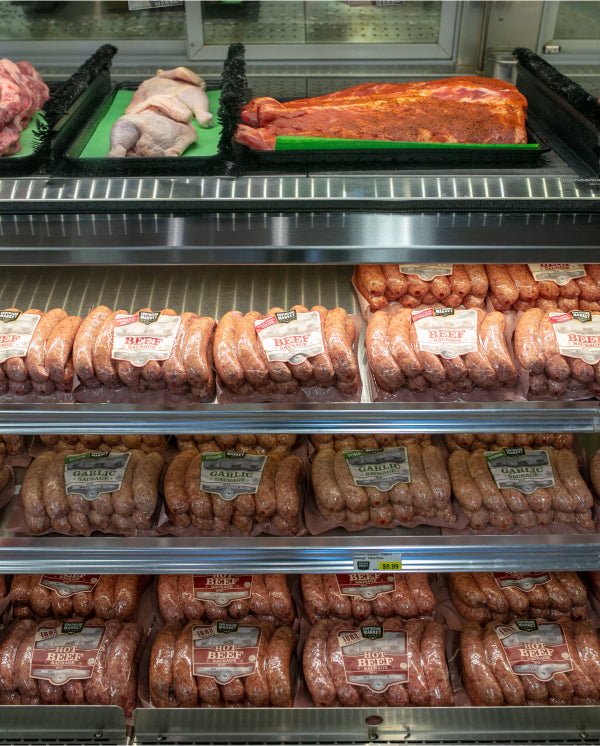Get Fresh, Locally Sourced Meat at Bagley Meat Market Edwardsville IL
Get Fresh, Locally Sourced Meat at Bagley Meat Market Edwardsville IL
Blog Article
Why Purchasing at a Regional Meat Market Guarantees Fresh, High-Quality Cuts
Purchasing at a neighborhood meat market offers distinct benefits that typically go undetected by consumers accustomed to bigger retail chains. The ramifications of choosing neighborhood extend beyond immediate benefits, triggering a more detailed assessment of what this selection genuinely implies for both consumers and the neighborhood economic situation.
Benefits of Regional Sourcing
In the realm of food purchase, the advantages of regional sourcing stand out plainly. By purchasing meat from regional markets, customers obtain direct accessibility to items that are often fresher and a lot more tasty than those found in larger, commercial grocery stores. Local sourcing decreases the moment and range food travels from farm to table, which not just improves taste yet likewise protects dietary value.

Moreover, local sourcing usually provides transparency pertaining to the origins of the meat. Consumers can inquire regarding the farming methods used, animal well-being criteria, and whether the meat is natural or grass-fed. This information encourages shoppers to make informed decisions straightened with their values.
High Quality Control Requirements
Regional meat markets often follow extensive top quality control requirements that ensure the items used fulfill high safety and freshness criteria. These requirements generally incorporate various phases of the meat manufacturing process, from sourcing to dealing with and storage space.
First, neighborhood markets frequently develop stringent supplier requirements, ensuring that just respectable ranches and manufacturers are used - bagley meat market edwardsville il. This minimizes the chance of contamination and promotes greater animal welfare requirements. Furthermore, several neighborhood meat markets carry out routine evaluations to confirm that the meat is refined under hygienic problems, better lessening wellness threats
Temperature control is another critical aspect of top quality assurance. Local meat markets frequently keep track of refrigeration systems to preserve ideal storage space temperatures, ensuring that meat remains secure and fresh for consumption. Moreover, the application of traceability systems permits markets to track the origin of their products, providing transparency and liability.
Last but not least, staff at neighborhood meat markets are usually educated to recognize indications of putridity and understand correct handling techniques. This dedication to quality control not only elevates the general requirement of the meat however also promotes consumer trust, making local meat markets a reputable source for top quality cuts.
Supporting Neighborhood Farmers
Supporting local farmers is important for promoting a lasting food system and improving community durability. They straight contribute to the resources of farmers in their region when consumers pick to go shopping at local meat markets. This not just sustains the regional economic climate however likewise reinforces the farming industry, ensuring that it remains practical and Recommended Reading lively.


Moreover, sustaining local farmers promotes a feeling of area and link in between consumers and manufacturers. It motivates openness in food sourcing and instills count on, as clients can develop relationships with the people who elevate their food. This straight connection eventually causes a more engaged and educated public, which is crucial for promoting for lasting agricultural methods in the future.
Lasting Practices
Lasting practices in meat markets play an important role in promoting environmental stewardship and guaranteeing pet well-being. Neighborhood meat markets frequently focus on sourcing their products from farms that carry out sustainable and ethical farming techniques. These methods include rotational grazing, which helps maintain soil health and wellness and minimizes carbon discharges, along with minimizing the use of antibiotics and hormonal agents in animals.
Furthermore, regional meat markets typically stress transparency in their supply chains. Customers are offered with details regarding the origin of their meat, allowing them to make educated options that align with their worths. By supporting local farmers that exercise lasting techniques, consumers add to the preservation of biodiversity and the reduction of transportation discharges connected with long-distance meat circulation.
Additionally, numerous local meat markets involve in waste decrease strategies, such as utilizing every part of the animal and advertising off-cuts that might or else go unsold. By promoting an extra lasting strategy to meat usage, these markets not just give top notch products find more but likewise contribute favorably to the environment and pet well-being. Fundamentally, purchasing at a local meat market lines up consumers with a broader motion in the direction of liable and moral food sourcing.
Customized Client Service
Shopping at a meat market commonly includes even more than just the items supplied; it is additionally regarding the experience and the relationships built in between consumers and personnel. Personalized customer care is a hallmark of local meat markets, establishing them in addition to bigger grocery chains. Well-informed personnel put in the time to comprehend specific customer preferences, ensuring that each browse through is tailored to certain needs.
Consumers benefit from experienced advice on cuts, food preparation methods, and prep work ideas, fostering a feeling of trust fund and loyalty. This personalized interaction allows clients to ask concerns and look for referrals, leading to notified investing in choices. Team member typically bear in mind regular clients and their choices, creating an inviting ambience that cultivates neighborhood connections.
Additionally, individualized solution expands to unique requests, such as custom-made cuts or specific prep work methods, which larger stores might not accommodate. This level of focus enhances the commitment of neighborhood meat markets to high quality and anchor customer complete satisfaction.
Essentially, customized client service not only boosts the shopping experience however additionally makes sure that consumers entrust the very best products suited to their culinary requirements, making every browse through a rewarding one.
Conclusion
Sustaining local farmers fosters community partnerships and strengthens the local economic climate, while sustainable techniques add to ecological stewardship. In addition, personalized consumer service improves the buying experience, making local meat markets a favored selection for customers looking for both quality and ethical considerations in their food sourcing.
The effects of picking regional extend past prompt benefits, prompting a better assessment of what this selection really means for both consumers and the regional economic situation.
Sustaining regional meat markets additionally adds to the local economy. Neighborhood meat markets frequently keep an eye on refrigeration systems to preserve optimal storage space temperature levels, making sure that meat continues to be fresh and safe for consumption.Neighborhood farmers are typically much more attuned to the specific requirements of their neighborhoods, increasing and growing plants animals that line up with local preferences and preferences. Sustaining local farmers promotes neighborhood partnerships and strengthens the neighborhood economy, while sustainable techniques contribute to ecological stewardship.
Report this page